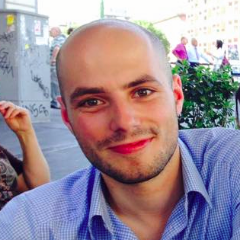Zeffirelli's La bohème is no spring chicken. First performed at La Scala in 1963, it has topped 200 performances at the House (dwarfed only by the 400 or so racked up at The Met). Yet on tonight's account, it still has the ability to thrill an audience, anecdotal evidence coming largely from the reactions of bright-eyed South American musicians in the audience, here to support one of their own. The Venezuelan invasion of Milan has begun: La Scala's exciting Progetto "El Sistema" commences this week. Gustavo Dudamel was on the podium, uniting Sistema figurehead the Simón Bolívar Orchestra with a watertight cast, the direction entrusted to Marco Gandini on Zeffirelli's behalf. The results were sublime, a Bohème with all the sheen of a fresh production.
Act I's garret crackles and pops in a slick stream of gags both familiar and new. Bohemians brave the cold in grubby finery, pattering through their severe abode like playful kittens. Marcello tries to burn a chair, prompting arm-waving panic from Rodolfo, before lunging at Rodolfo's newly penned play, the writer at first dumbstruck, then blithely flinging his capolavoro into the stove to a tingling glimmer from the pit. When Schaunard turns up with wine, food and cigars, we are cooking on gas; Mattia Olivieri makes an irrepressible house debut combing a luxurious, even baritone with acrobatic leaps to tabletops amidst his swirling cloak. There's deathly quiet and a full-stage freeze when Benoît comes to claim the rent. But, in the tinderbox atmosphere of the garret, it takes but a spark for the mayhem to explode.
Dudamel crouches low like a leopard, ready to pounce on the score's fast-changing permutations. Vital and enterprising, he steers the sound spectrum towards ochre hues and blistering combustion. The maestro's ardour goes well – he has made a handful of visits to La Scala in recent years – and there is sensitivity to match, his indulgent rallentandi wrapping around the singers. A lovestruck Mimì is powerless to resist when Rodolfo possesses her at the end of Act I. Dudamel slows heartbeats with lugubrious gestures, summoning a glittering plume that sends shudders down the spine.
Such orchestral wizardry caps an arresting vocal sequence. Maria Agresta defers the thaw in her vocal flicker, making the climax in Mimì's opening aria even more radiant. Fussiness distracts when Vittorio Grigolo's Rodolfo launches papers skywards during "Che gelida manina". But the singing is without affectation – wide open and white up top, yet undeniably thrilling. Interrelationships acquire a more complex texture affront Act III's snowy gate of Paris. Rodolfo and Marcello warm from icy vexation to brotherly love, Massimo Cavalletti evoking the painter in a modestly sized yet perfectly formed vocal display. Mimì and Rodolfo rolled tenderness, nostalgia and torment into one. They kindled nicely in contrast to Marcello and Musetta's venomous exchange of expletives.
"Opera ends long after the curtain falls", according to Maria Callas. If the curtain ever falls on Zeffirelli's Bohème, we'll need some time to get over his gargantuan Café Momus. The Quartier Latin cranes way up the fly tower. The stage heaves with members of the Simón Bolívar National Youth Choir. Musetta knocks us for six.
Entering the melee in horse-drawn carriage, eyes brimming with wild mischief, the frisky diva had us stifling back laughter even before she rendered the square a wreck of overturned tables and smashed plates. Angel Blue made her house debut as Musetta, her singing sometimes rough-cut, but what a diamond! Sassy, trickling, it generates enamour all round. A maddened scrum forms when Musetta unsheathes her leg. There is so much to take in that we don't notice our bohemians knocking back the drinks. A wonderful evocation of creeping intoxication.
This is a well-oiled operatic machine, with all of the cogs whirring. Act IV was a case in point. Deft stagecraft transforms chattering bohemians into pale-faced horror when a dying Mimì makes her enrty. The set tunes into the shift in atmosphere, its stark attire now full of dejection. Agresta splutters Mimì's final incantation of love, agony invading every syllable. The orchestra withers and expires in a glow.
A singular moment in the final act failed to click due to an over-egged pudding. Grigolo puffed and puckered in preparation for his cries of "Mimì!", and overshot the target... but La Scala are evidently hitting theirs. Their targets, that is. Principal Director Riccardo Chailly takes full command of the podium in 2017, and he has vowed to deliver what he deems a winning formula: heavy programming of Italian repertoire, matched with stylish, distinctive music-making. That was the blend achieved tonight. Whilst prepping us for the fast-approaching Progetto "El Sistema", this performance simultaneously whets our appetites for the seasons ahead.




